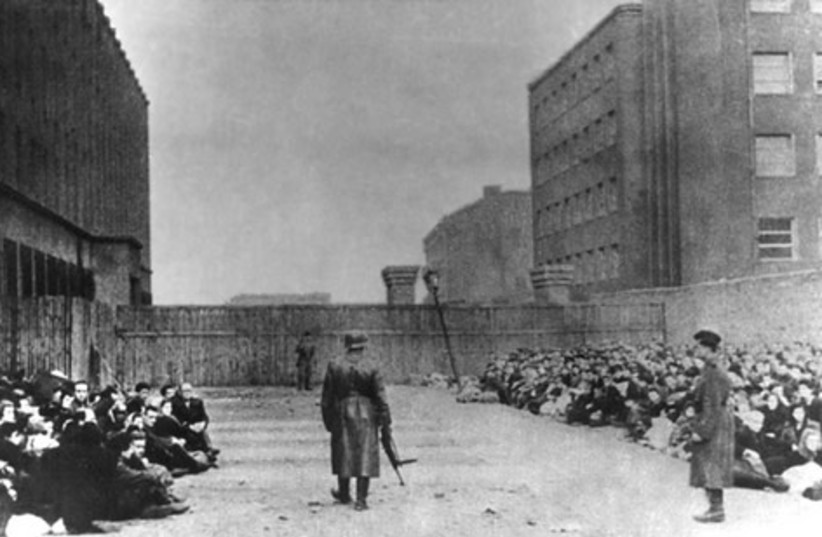The transition from mourning on Remembrance Day to celebrating Independence Day is always jarring. But this year, it will be especially challenging, with some 1,200 people killed on October 7, 250 kidnapped, and the country at war on multiple fronts.
Here in Israel, the painful memory of October 7 isn’t merely a shared national story, but an ongoing personal grief carried by the countless friends and relatives of all the murdered, the wounded, the hostages, and the fallen soldiers and security personnel. Almost everyone, at least to some extent, knows someone who has been killed or injured.
Every lost individual is a lost world, causing the wave of their hopes and dreams to crash against the banks of the present. On the other hand, we also experience, on a daily basis, the benefits and blessings of living in the modern State of Israel. Each and every one of us will have to navigate the transition from Remembrance Day to Independence Day, bringing into sharp focus the juxtaposition we face daily.
Horror and hope
AS WE live through this moment in Jewish history, I feel haunted – and comforted – by the words of a group of teachers in the Warsaw Ghetto. On Passover of 1942, they gathered together to conduct the Seder, even amid chaos, death, and destruction. To help put the holiday in perspective, they wrote a brief introduction to the Haggadah, describing how, on that Passover, they “feel that knocking at their door, simultaneously, are both the angel of death and Elijah the prophet.”
This pairing of Elijah – always recalled at the Seder and seen throughout the Jewish tradition as a sign of hope, resolution, and the forerunner of the Messiah – with the angel of death, an obvious sign of doom, is what we are again experiencing today.
I have experienced and heard countless moments of this horror phenomenon existing alongside hope and bravery, especially involving the 13 students and alumni we have lost from our network of schools and educational programs. During a shiva mourning period, I heard a father speak about his son who fell in battle and how they had long enjoyed a shared havruta (small study group), then mention that the last Mishna they learned focused on the prophet Elijah.
Then there was 24-year-old IDF Captain Itai Seif, whose sister Shachar, a teacher in our school system, gave birth a month early. Itai was able to leave Gaza to carry his newborn nephew to Eliyahu Hanavi’s chair at the brit milah, only to fall in battle a month later, on Shachar’s due date.
There was also paramedic Amit Mann, shot dead by Hamas terrorists on October 7 as she was treating injured people in a clinic on Kibbutz Be’eri. Surrounded by victims in the clinic under siege, she was aware her final moments were approaching, even as she worked to save lives. She texted her sister, “I don’t think I’ll get out of this. I love you.”
I still think daily of Yehonatan Semo, who fell in battle only for the army to later find a letter in his pocket requesting that his organs be donated – an echo of how Elijah, throughout Jewish tradition, gives new life to many.
I hold especially dear the memory of Aner Shapira, packed into a roadside shelter with dozens who had fled the Nova festival on October 7 as terrorists attacked them with grenades and gunfire. Aner stood up to the Angel of Death as he caught one grenade after another, valiantly tossing them back at the terrorists trying to kill them. While he emulated Elijah himself in defense of the Jewish people, the Angel of Death was also there, as Aner died when one of the grenades he could not pick up quickly enough exploded on him.
This week, especially, we are a nation of survivors who cannot yet make sense of these tragic occurrences. But in our darkest moments, there is some consolation in the knowledge that, even while facing the Angel of Death, countless stories of redemption have emerged – one Elijah after another. As we prepare to mourn even more deeply on Remembrance Day and struggle to even think of how we can celebrate Independence Day at a time like this, it is imperative that we remember that it is not just that the Angel of Death can sometimes come at the same time as Elijah, but, as the rabbis of Warsaw wrote, Elijah can come alongside that Angel of Death. This should provide us with the perseverance to which we all aspire.
Even in our moment of grief, we mustn’t lose sight of Independence Day, the redemption on the horizon, and what we are collectively building. In Israel, modern statecraft and the prayer for the Messianic age are one and the same. We must continue the work of Itai, Amit, Yehonatan, Aner, and all the others. This is the work we were chosen to do.
IN A well-known Talmudic story, Rabbi Yehoshua ben Levi asked Elijah: When will the Messiah come? Elijah said to him: Go ask him. Rabbi Yehoshua ben Levi asked: And where is he sitting? Elijah said to him: At the entrance of the city of Rome. Rabbi Yehoshua ben Levi asked Elijah: And what is his identifying sign by means of which I can recognize him? Elijah answered: He sits among the poor who suffer from illnesses. And all of them untie their bandages and tie them all at once, but the Messiah unties one bandage and ties one at a time…
Rabbi Yehoshua ben Levi went to see the Messiah. He said to the Messiah, “Greetings to you, my rabbi, and my teacher.” The Messiah said to him, “Greetings to you, ben Levi.” Rabbi Yehoshua ben Levi asked him, “When will the master come?” The Messiah said to him, “Today.” Sometime later, Rabbi Yehoshua ben Levi came to Elijah: The Messiah lied to me, saying, “I am coming today, and he did not come.” Elijah told him that this is what he said to you: He said that he would come “today, if you would listen to his voice” (Psalms 95:7).
Today, listening to the voice of God means having faith in the redemptive process that God has set into motion. We continue to build the country through tears that we pray turn from sorrow to laughter and joy.
The writer is president and rosh yeshiva of the Ohr Torah Stone network.

